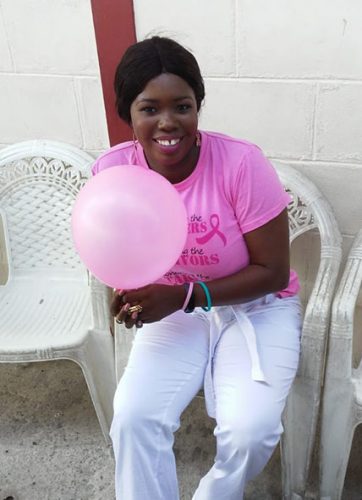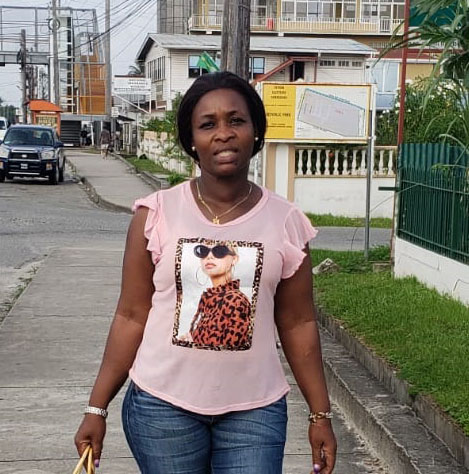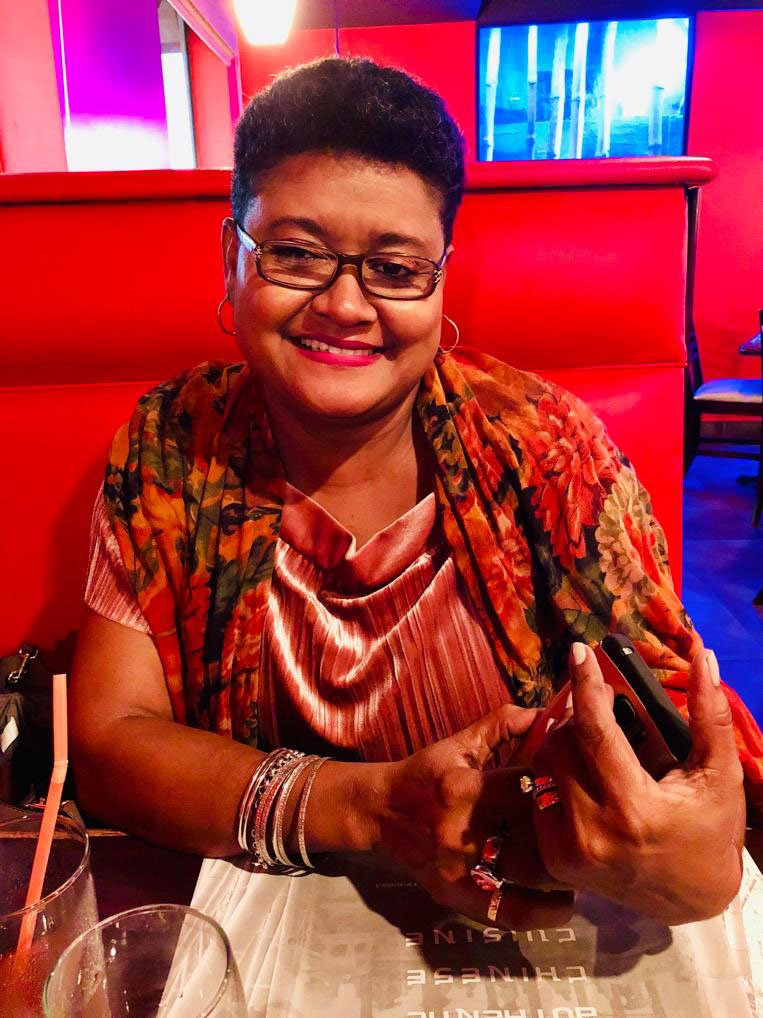Lumps in their breasts alerted two women that something was wrong and even though they quickly sought medical help, they were not prepared to be diagnosed with breast cancer.
But today, after mastectomies and chemotherapy, Christine Jardim and Antonette Ifill are encouraging women to get themselves checked out and to not be ashamed if a breast has to be removed, because life is more important. As Guyana joined the world to observe World Cancer Day last Tuesday, they urged women not to be satisfied with one diagnosis, but to seek others, especially if the problems persist, as they were told initially that they did not have cancer; later these first diagnoses were proved wrong.
For Jardim, Ifill and Zerolene Lewis, who has removed both of her breasts, it is time for women to be more conscious about their bodies and their health and they all want to speak out to help women understand that cancer is nothing to be ashamed of.

“… Cancer is not something we bring upon ourselves. By sharing it, you can go and get a check-up and you can tell another a friend to encourage them to do the same. I would share it with the world, I am not ashamed. It is nothing to be ashamed of,” Jardim told Stabroek Weekend in an interview.
‘Reasonable size’
It was a day in 2013 when Jardim felt a lump in her right breast which she said was of “reasonable size, like a tennis ball.”
She was unsure how she missed it before as she did regular self-examinations. With the encouragement of a friend she visited the doctor and had several tests done. The results indicated that it was not cancerous and as such the mass was removed.
But years later, Jardim said, she felt another lump at the side of her breast. She put it down to fat and waited another six months before she went to have it tested. This time, she travelled to Trinidad, and the results were given to her over the telephone as she had returned home.
“When the doctor called me and said it was cancerous I was in shock and I said, I don’t understand what you are saying, I will get my husband to call you,” Jardim said of the moment she received the news.

She was in a flood of tears by the time she came off the telephone and she recalled that it was her daughter who started to console her as she immediately knew what the news was.
“She said, ‘mommy don’t cry you will make it, we will get through it,’” she said of her 26-year-old daughter, whom she said was a tower of strength during the process.
After hearing those words, Jardim said, she pulled herself together and her husband returned a call to the doctor. After discussion with an oncologist, it was suggested that she could have the lump removed. But Jardim said she decided to do a mastectomy instead as she was afraid it would return, especially since her family has a history of cancer.
“At first, I thought about how I would look, but I have two kids to live for and I said it is modern time I could put on a breast if I want. I was grateful that I had life and my husband was also very supportive,” she said.
Following the surgery, Jardim did chemotherapy and she had another breakdown when a lump of her hair came out as a result of the treatment.
“But I stopped, and I said I have life that is what it is important, and I went to the hairdresser and shaved everything off,” she said.
During the radiation period, she had no trouble but she shared that after the treatment she did fall into a bout of depression and cried for “no reason” but she was told it was a side effect of the medication she used.
“I want to tell women don’t wait until you see a lump. Women do your yearly checkups. Because if I had gone earlier it would have been better for me. I was at stage two. I could have been zero or one,” the businesswoman said.
She said family is important when fighting cancer as them being there for you is what gives you strength. “You need that love. Sometimes I did not feel like eating and my daughter was there and always made me eat something. I had my husband, my son and my cousin. They never allowed me to travel to Trinidad alone for treatment. Someone was always with me. Family is really important, you can’t do it alone, you need that love,” she stressed.
Alarming
It was in March, last year that Ifill felt the lump in her breast and for her it was alarming since she self-examined regularly. A visit to the doctor saw her being given some anti-inflammatory medication. But a week later the lump was still there, and the woman said she became a little concerned.
She returned to the doctor and they discussed that the problem might be due to a hormone imbalance and an ultrasound was done. This revealed that there was a mass, but it was not cancerous.
“So I was relieved, but three weeks later I noticed it was progressing and I decided that something more is wrong and I went back to the doctor and then I learnt about biopsy and I made an appointment of have it done,” she shared.
The schoolteacher said the first result showed non-cancerous, but the doctor ordered another test. Upon the advice of the doctor, she took the results to the Oncology Department of the Georgetown Public Hospital, but even then Ifill said she was unsure of the results.
It was on July 23 that she was given the diagnosis.
“When the doctor was talking, I wasn’t listening. There were so many people in the room. But my cousin was there, and she was taking the information. I was so concerned with self-image… I was asking if they could not save the breast and take the lump.
“I went home and then is when it kind of sink in. I cried because I did not know about cancer, I did not know what I was going into,” the mother of one said.
She said she had to use the internet to find out more.
The chemo, she said, took a mental toll on her, but she followed the instructions to eat properly and stay positive and the physical effects were minimal.
“I would encourage people to stay positive… A lot of people would tell you negative things about the chemo, thinking positive is good. I try to block out the negative thinking and here I am still. I seek wisdom and strength. The doctors and nurses were very good to me and I learnt a lot from other patients,” Ifill said.
“Cancer is not the end of the world. It changes you because it is the journey you go through, but it brings out a good side in you to educate people and yourself. I am not saying it is going to be easy, but it is better you know what is happening before it is too late. I did not even know there was an Oncology Department at Georgetown Hospital but now I know, and I can encourage people to go,” she further said.
Fungus
Lewis was told that the skin breakage on her nipple was as a result of a fungus and she was given medication which she stopped taking after a while because it made her nauseous.
Because there was no healing, the mother of three said, she travelled from Linden to Georgetown to see a doctor and he indicated that it was an ulcer. Lewis said she was a little skeptical, but she took the two-week treatment prescribed. There was no relief and it was then she decided on the biopsy.
It showed cancerous but the doctor said it could be treated in a year.
“But then it started oozing and he took off the entire nipple and he said it was okay. And to be truthful, I felt okay after that,” she continued.
But during a visit to the United States in March 2018, she decided to get a checkup and it was then she was told she had stage three breast cancer.
“I did not cry or anything. I just knew what I had to do. It was cancerous, so why keep the breast? I had both of them removed because I did not want to have it in the other one,” she said.
Support from her family was good and she completed the chemotherapy and radiation with few complaints. Lewis said she knows it would not be as easy for other women, but she encourages them to be checked out and if it is cancer just remove the breast as there is nothing to be ashamed of.
All three women said they now work to help other women. They believe that just by sharing their stories they can also assist. Jardim said she even helps out financially if she sees a need. She is happy for the survivors’ group that they have with the help of Bibi Hassan of the Guyana Cancer Foundation, whom she said has been fantastic to them.
Most common cancer
Figures up to 2017 show that breast cancer was the most common cancer in Guyana.
According to statistics from the Guyana Cancer Registry, women between the ages of 50 and 59 have the highest incidence of breast cancer. The registry indicated that data is actively collected and as such figures can change but what is provided is what is currently reflected in its database.
In 2013, some 293 women were recorded as having breast cancer, with 118 of them being between the ages of 50 and 59. The age group with the second highest number of cases was between the ages of 60 and 69, with 63; followed by the 40 to 49 age group which accounted for 45 cases. There were 31 cases among women aged 30 to 39 years old and there were 23 for those aged 70 to 79, 7 for those aged 20 to 29 and 4 for those over 80 years old. In that year, some 37 women died from breast cancer.
The following year, the 50 to 59 age group was again the group with the highest number of cases as it accounted for 58 of the 181 women diagnosed. It was followed again by the 40 to 49 age group with 53. The 60 to 69 age group accounted for 28, while those aged 30 to 39 accounted for 21. There were 18 women aged 70 to 79 who were diagnoses, 1 over 80 and 1 between the ages of 20 to 29. Twenty-five women died that year.
There were 193 women diagnosed in 2015 and the pattern continued with the 50 to 59 age group accounting for 65; the 40 to 49 age group accounted for 42 cases; the 60 to 69 age group accounted for 35 cases; the 30 to 39 age group saw 29 cases; the 70 to 79 had 20 cases and the 80 plus group once again accounted for 1. There was no one in the 20 to 29 age group. Twenty-four women lost their lives that year.
The figures provided showed an incidence of 158 in the year 2016, and 53 of those were women between the ages of 50 and 59. There were 42 in the 60 to 69 age range; 28 aged 40 to 49, while the 30 to 39 age group saw 14 cases; the 70 to 79 age group saw 19 cases and the 80 plus and 20 to 29 age groups each accounted for one case. Twenty-four women died that year.
In 2017 there was an incidence of 149 and this was the only year that the 50 to 59 age group did not account for the highest number of cases. The 36 cases in that age group were below the 44 cases that the 60 to 69 age group accounted for. The 40 to 49 group saw 34 cases; the 30 to 39 age group had 16 cases, with the 70 to 79 following with 15, and the 80-plus age group 4. Once again, there were no cases recorded for the 20 to 29 age group. The mortality figure for that year was not available.
Cervical cancer is the second most common cancer in Guyana, according to the registry’s figures up to 2017. For the same period 118, 113, 68, 72 and 163 cases were recorded for the years 2013, 2014, 2015, 2016 and 2017, respectively. From 2013 to 2016, 34, 13, 23 and 21 women died annually. As with breast cancer the mortality figure for the year 2017 was unavailable.
If you are a survivor and need support, contact Bibi Hassan of the Guyana Cancer Foundation on 618-2085.










